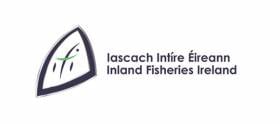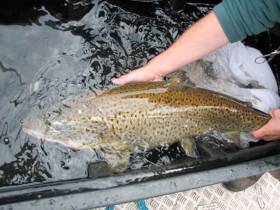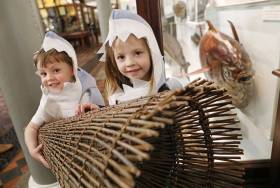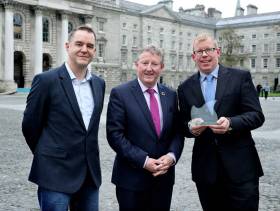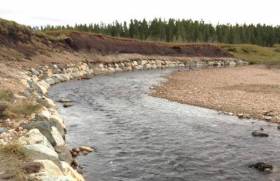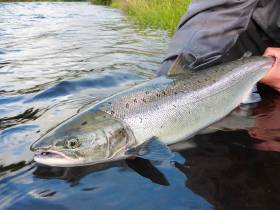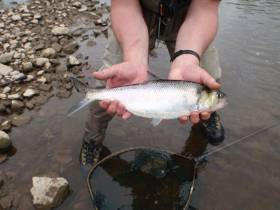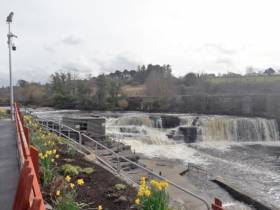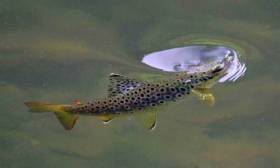Displaying items by tag: Inland Fisheries Ireland
Inland Fisheries Ireland (IFI) has prosecuted Irish Water for two separate pollution incidents which occurred in Cavan last summer.
On Thursday 6 June, Judge McLoughlin twice convicted Irish Water at Cavan District Court under the Fisheries (Consolidation) Act 1959 for allowing harmful substances to enter the water on two occasions in June last year.
Over 600 fish were killed as a result of one pollution incident while an important habitat for spawning and young fish was damaged as a result of the other.
The court heard evidence from fisheries inspector Cormac Goulding that on 19 June 2018, staff from IFI noticed that the river downstream of the Ballinagh Treatment Plant in Cavan was in very poor condition.
The water was cloudy and the river was covered in sewage fungus and algal growth.
Following an investigation, it was discovered that untreated sewage was being discharged from the water treatment plant and at the pumping station further downstream.
Irish Water issued a report to IFI in response to the prosecution which revealed that their computerised monitoring system had been offline for six days, which meant that no alerts had been received about the problem.
The effluent was being discharged into aquatic habitat suitable for spawning or young trout.
Judge McLoughlin fined Irish Water €3,000 and total costs of €4,679 were awarded to IFI.
A separate pollution incident occurred a few days later on 25 June 2018 in Cavan Town River.
Judge McLoughlin heard evidence from Ailish Keane, senior environmental fisheries officer at IFI, about how the pollution incident resulted in the death of hundreds of fish including 687 native brown trout.
An investigation found that the fish kill was caused by the release of sewage effluent into the river from an overflow culvert located under Farnham Street Bridge.
Irish Water were again convicted and fined €4,000 plus costs of €4,346.
Milton Matthews, director of the North Western River Basin District at IFI, said: “In both cases in Cavan, harmful material was discharged into local rivers and in Cavan town this resulted in a large kill of over 600 native brown trout, of all age classes.
“As it can take years for a waterbody to recover to its former condition following pollution incidents, it is crucial that robust management systems are in place to prevent avoidable incidents which can have a serious impact on our wild fish and their natural habitat.
“The restoration of the aquatic habitat and the maintenance of water quality is vital if we are to enable wild fish populations to recover naturally.
“We are working to protect, conserve and develop our natural fisheries resource which is of significant recreational and economic value to communities in Cavan and across the country.”
Two Anglers Plead Guilty To Illegal Fishing Methods On Cong River During Annual Closed Season
Two anglers recently appeared in court on charges relating to illegal fishing methods on the Cong River and fishing during the closed season.
On Thursday 23 May, Mindaugas Jenkus of Claremorris, Co Mayo and Dalius Bureninas of Birr, Co Offaly appeared in front of Judge Mary Fahy at Clifden District Court in respect of breaches of fisheries legislation on the Cong River which occurred on 9 September 2018.
Both defendants represented themselves and pleaded guilty to strokehauling (using a weighted instrument or device with a rod and line or otherwise to foul-hook fish) and fishing out of season on the Cong River.
Bureninas also pleaded guilty to a further charge of obstruction under Section 301 (7) of the Fisheries (Consolidation) Act 1959.
Fisheries officer Paul Reynolds outlined the facts of the case to the court, while assistant fisheries inspector Barry Kelly also told the court that the Cong River was a very important salmonid fishery with has a large run of Atlantic salmon and a good stock of brown trout.
It is also of particular conservation interest in relation to ferox trout, for which the river is renowned.
The Cong River is one of the main tributaries of Lough Corrib, and is one of the most important salmon rivers in the west of Ireland
Fisheries inspector Pat Gorman stated that these offences were very serious due to the conservation status of the Cong River, when asked his opinion by Judge Fahy.
The judge commented on how serious a matter these offences were and referred to Bureninas giving a false name and address when lawfully demanded. She also noted that Mr Jenkus had a recent conviction for a similar fisheries offence.
Judge Fahy stated that if both defendants paid costs of €600 each to the court at a sitting of Clifden District Court on 26 September, she may deal with the matter by way of a somewhat reduced fine.
She also warned both men to be on their best behaviour and not to come to the attention of Inland Fisheries Ireland (IFI) again as there was a risk of a custodial sentence being imposed.
“The Cong River is one of the main tributaries of Lough Corrib, is one of the most important salmon rivers in the west of Ireland and provides habitat for a very unique salmonid sub-species, ferox trout,” said IFI chief executive Dr Ciaran Byrne when commenting on the case.
“The Cong River is closed to angling during September as a conservation measure relating to both Atlantic salmon and ferox trout. The river attracts many anglers and tourists annually to fish for these unique wild salmonid species.”
Research Vital As International Year Of The Salmon Highlights Challenges To Iconic Species, Says Canney
Sean Canney, Minister of State with responsibility for the inland fisheries resource, visited the River Erriff in Co Mayo recently to understand more about the current issues facing Ireland’s salmon.
Inland Fisheries Ireland (IFI) has designated the River Erriff, one of Ireland's premier salmon and sea trout fisheries, as the National Salmonid Index Catchment.
Salmon and sea trout migrating upstream in the Erriff must pass through fish counting and trapping facilities located at Aasleagh Falls, where the Erriff flows into Killary Harbour.
Since 1985, salmon and sea trout smolts and kelts migrating downstream pass through a trap located below Tawnyard Lough.
The facilities at this research station are used for a wide range of scientific research and monitoring activities on the salmonid populations and their migratory behaviour.
Minister Canney met with Dr Ciaran Byrne, CEO of Inland Fisheries Ireland, who outlined that fisheries managers and scientists have been concerned for a number of years about the declining numbers of salmon returning to the Irish coast — a key concern in this International Year of the Salmon.
In the mid-1970s, almost 1.7 million salmon were estimated to have returned to Ireland, compared to only some 250,000 today.
Salmon are a key indicator species and they tell us so much about the health of our aquatic environment, IFI says.
And the issue is not unique to Ireland, as populations over the entire southern part of the North East Atlantic — which includes France, Spain, England, Scotland and southern Iceland — have declined significantly in the past number of decades.
Following the visit, Minister Canney commented: “Salmon are an iconic fish species in Ireland. They have always had a special place in Irish culture, heritage and mythology with stories such as the ‘Salmon of Knowledge’ familiar to generations of our school children.
“While they are widely distributed throughout Irish river systems, with over 140 designated salmon rivers, the numbers of salmon returning to Irish rivers, in common with salmon rivers internationally, have shown a worrying decline in recent decades.
“Today they remain an important resource to many people, playing an invaluable ecological, social and cultural role in Ireland and across the Northern Hemisphere.
“International Year of the Salmon offers us an opportunity to start an important conversation around how we can protect, conserve and restore salmon populations in Irish and international waters and how we can inspire action.
“I am delighted to see the excellent research facility here in the Erriff. I am assured that the ongoing scientific research by IFI adds to our understanding of the issues facing salmon and will inform Ireland’s position as part of the EU delegation in discussions which will shortly take place at Nasco — the North Atlantic Salmon Conservation Organisation — on this important topic.”
Fishy Fun At The Natural History Museum This July
Ireland’s fisheries resource is set to come alive at the Natural History Museum this summer at a free event called Fishy Fun.
A range of interactive activities suitable for all the family will be part of the special one-day event on Saturday 20 July, one of a number of initiatives this summer to recognise International Year of the Salmon.
Visitors to the ‘Dead Zoo’ on the day will learn about the fantastic collection of fish on display and how the salmon, Ireland’s most iconic fish species, is facing its biggest challenge yet.
Fisheries staff will be on hand to help youngsters examine the creepy crawlies which live in Ireland’s rivers and lakes via microscopes. while novice anglers can try their hand at fishing through a virtual fishing simulator.
As well as the museum collection, aquariums will also showcase some of the freshwater fish which live in waters across Ireland.
“We are looking forward to introducing the public to the mystical aquatic world at this family-focused event,” said Inland Fisheries Ireland chief Dr Ciaran Byrne.
“Novice anglers, future fisheries biologists or scientists or anyone who has an interest in the natural world will enjoy learning more about the fish and creatures which live in our waters and what we can do to ensure their ongoing conservation for future generations.”
The free Fishy Fun event will take place from 10am-4pm on Saturday 20 July in the National Museum of Ireland – Natural History, Merrion Street, Dublin 2.
As part of the event, children and schools are also invited to enter a national colouring competition, The Salmon of Colour, which will be available in the museum and online in the summer months with more information coming soon.
Minister Welcomes Signing Of MOU Between Inland Fisheries Ireland & Trinity College Dublin
Inland Fisheries Ireland and the School of Natural Sciences at Trinity College Dublin have signed a memorandum of understanding (MOU).
The MOU will enable both institutions to collaborate across fisheries research projects.
Sean Canney, Minister of State with responsibility for the inland fisheries sector, attended the signing and welcomed the formalisation of the partnership across fisheries research.
The MOU is a culmination of a 20-year relationship between the two organisations and aims to bring greater synergy to their working relationship. It will increase opportunities for more collaborative projects through direct co-operation and sharing of resources.
The MOU was signed by Professor Andrew Bowie, associate dean of research at Trinity College Dublin, and Dr Ciaran Byrne, chief executive of Inland Fisheries Ireland (IFI).
Commenting on the significance of the partnership, Minister Canney said: “I hope that the MOU will act as an impetus to move forward with joint research to support the conservation and development of our natural resource.”
In the year ahead, research around climate change and the challenges it presents for the fisheries resource will continue to be a focus for both organisations.
IFI has established a national climate monitoring programme in water bodies nationwide with a view to producing high-quality research to inform management strategies for freshwater and marine fish species experiencing the effects of climate change.
Trinity College Dublin recently appointed two academic staff to the School of Natural Sciences whose expertise are centred on marine ecology and fish biology. Those appointments bolster the existing capacity within the School of Natural Sciences for impactful and innovative research that is highly relevant to IFI’s broad remit.
Dr Byrne said IFI “is a unique research agency, where high-level scientific expertise in fisheries ecology is supported by a nationwide sampling programme which includes index river catchments that provide invaluable ecological time series.
“We collaborate in numerous research programmes, conducting applied science to inform expert advice on the management of Ireland’s inland fisheries resource.
“The natural affinity of Inland Fisheries Ireland and the School of Natural Sciences at Trinity College Dublin has been formalised today by the signing of this MOU. Both institutions have long histories of scientific discovery and producing high quality research; by consolidating future collaborations the inland and marine fisheries resource will benefit from the combined expertise of our researchers to deliver excellent research, which will support conservation and management of a precious natural resource.”
Prof Bowie added: “Our zoology department conducts world-leading research on the impacts of climate change across marine, freshwater and terrestrial systems.
“That department’s team of computation modellers, ecosystem ecologists, and conservation biologists represent a critical mass of expertise that should prove valuable partners for addressing broad questions with Inland Fisheries Ireland about climate impacts on fisheries resources.”
Inland Fisheries Ireland Launches 2019 Funding Call For Conservation & Development Projects
Inland Fisheries Ireland has announced a new funding call for 2019 with three funding schemes now open to angling clubs and community groups.
The funding has been made available for fisheries conservation projects and development projects nationwide through the National Strategy for Angling Development (NSAD).
Applications are invited from angling clubs, local development associations, tidy towns and others who may be looking to carry out projects.
The 2019 funding call consists of three schemes.
The NSAD Capital Grants Scheme 2019 (€136,000) is aimed specifically at capital improvement works with grants available to groups and individuals looking to improve angling access and infrastructure in their locality.
The Salmon and Sea Trout Rehabilitation, Conservation and Protection Fund focuses on the protection of both salmon and sea trout. It will fund rehabilitation, protection and conservation projects, all of which must focus on salmon or sea trout. This fund replaces the Salmon Conservation Fund and extends it to include both salmon and sea trout with project values starting from €2,000 for awareness projects. The upper limit of €15,000 has been removed.
The Midlands Fisheries Fund (€50,000) will focus on conservation and rehabilitation projects in the midland fisheries permit area. The fund has been created through contributions from the permit income received via the Midlands Fisheries Group permit area.
Sean Canney, Minister of State with responsibility for the inland fisheries sector, said: “Since the inception of the National Strategy for Angling Development, we have invested €3.4 million in fisheries development, protection and conservation projects across the country.
“Progress is being made in the delivery of projects which support vital fisheries conservation and rehabilitation and which enhance Ireland’s angling offering. The fisheries resource should be enjoyed by all and this funding call today once more will help bring angling to the broader community in a conservation focused manner.”
Suzanne Campion of IFI said it looks forward to working with community groups from application to delivery stage on their projects.
“We are already partnering with over a hundred clubs and associations in the delivery of fisheries projects. The commitment of these groups in making a valuable difference to their locality is inspiring.”
For more information about the 2019 funding call, to download an information booklet and to submit an Expression of Interest, visit www.fisheriesireland.ie/funding.
All applicants must apply through the Expression of Interest, which opens today (Tuesday 16 April), to progress to full application. Full applications may be submitted from Monday 20 May with the closing date for applications on Thursday 20 June.
IFI will be hosting information workshops over the coming weeks for those looking for further information or support with the application process:
- Dublin — Citywest Hotel — Monday 29 April
- Cavan — Cavan Crystal Hotel — Tuesday 30 April
- Donegal — Harvey’s Point — Wednesday 1 May
- Ballina — The Great National Hotel — Thursday 2 May
- Galway — Maldron Hotel, Oranmore — Friday 3 May
- Limerick — Maldron Hotel — Tuesday 7 May
- Tralee — Ballygarry Hotel — Wednesday 8 May
- Cork City — Rochestown Park Hotel — Thursday 9 May
- Kilkenny — Ormonde Hotel — Friday 10 May
Appeal For Anglers To Become Citizen Scientists As Part Of National Salmon Scale Project
Anglers are needed as citizen scientists for a new National Salmon Scale Project, says Sean Canney TD, Minister of State with responsibility for the inland fisheries sector.
Minister Canney said: “As we celebrate International Year of the Salmon, this project will help researchers understand the challenges which salmon are facing today.
“The project, which has been initiated by Inland Fisheries Ireland, aims to collect vital information through scales taken from salmon and sea trout which are caught in Irish rivers and lakes and will contribute to international efforts to conserve wild salmon.”
Fish scales record the life history of a salmon, and one scale can reveal a lot about the lifestyle and behaviour of the fish.
Scales can tell scientists what age the fish is, how many winters it spent at sea, how many times it spawned, how slow or fast it grew, what it ate and how long it spent in the river before it went out to sea.
Scales can also reveal the general feeding area where the salmon travelled to in the ocean, whether it went to the Faroe Islands, the Norwegian Sea or all the way to West Greenland. Scales help scientists to understand the biology and ecology of Irish salmon and sea trout.
As part of the project, anglers are asked to take a scale sample from a salmon or sea trout by gently scraping and removing approximately 20 fish scales using a clean knife, then post their samples to Inland Fisheries Ireland (IFI) using the sample envelopes which will be made available to them.
Scales can be removed from both harvested and catch-and-release fish. Sampling of fish for release should be handled carefully and fish should be only briefly removed from the water with every effort made to avoid injury or stress while weight should be estimated.
Information from salmon scales is used in setting conservation limits for Irish rivers. Conservation limits for each river are set based on the proportion of salmon who have spent one winter at sea and those that have spent multiple winters at sea.
The conservation limit for a river represents the number of spawning salmon required to produce the next generation of salmon and this information helps inform angling regulations and management. Information from scales on multi-sea winter salmon entering rivers in spring is also important for managing individual river stocks.
Dr Paddy Gargan, senior research officer at IFI, said: “It is important to have anglers collecting scales as they can provide broad coverage across Ireland and collect scales throughout the fishing season.
“A scale resource which includes many different river systems in Ireland over several years is a great asset from a research perspective as it allows us to examine the factors affecting salmon survival at sea. We can compare how factors, such as climate change, are impacting survival by analysing today’s salmon scales alongside those from many decades ago.”
All scales collected through the National Salmon Scale Project will be added to the National Salmon Scale Archive which is managed by IFI.
The archive, which consists of a dedicated storage facility and associated database, currently holds 19,300 scale samples from a total of 38 rivers representing 152 sampling years. The National Salmon Scale Project aims to increase the scale resource available to scientists for ongoing and future research.
IFI’s head of research and development Dr Cathal Gallagher said: “Ultimately the National Salmon Scale Project will help inform future salmon management policies and activities.
“It is fitting therefore that we are launching this campaign during International Year of the Salmon which aims to raise awareness of what humans can do to ensure salmon and their habitats are conserved and restored against a backdrop of several environmental pressures. This project offers anglers a very tangible and practical way of playing an active role in salmon conservation.”
For more information on the National Salmon Scale Project, including how to take a sample safely and to request sample envelopes, visit the project webpage. To find out more about International Year of the Salmon visit YearOfTheSalmon.org.
Ireland’s Role In Europe-Wide Research Programme To Preserve Threatened Migratory Fish
#MarineWildlife - A new project which aims to promote international action and co-operation to conserve vulnerable migratory fish species launched yesterday, Thursday 28 March.
The DiadES initiative will see 30 partners from different countries participate in this European project, with Inland Fisheries Ireland (IFI) leading out on the project in Ireland.
The project launches as migratory fish and their habitats continue to come under pressure as a result of human activity and climate change.
It will focus on fish such as shads, lampreys, salmon, trout and mullet which are known as ‘diadromous’ fish as they migrate between fresh and salt waters to reproduce or feed.
The DiadES initiative intends to improve knowledge of the ecological, economic and cultural benefits offered by these migratory species while assessing the possibility of these species changing their locations due to climate change.
It will also examine the emergence of new interactions between fish territories as a result of these relocations.
In addition to collaboration across research and knowledge sharing between countries, the project will take a global multidisciplinary approach.
It will focus on several species across different geographical areas and involve researchers in the field of natural sciences and environmental economists as well as an experienced network of fish managers.
As part of the research, a transnational interactive atlas will be produced which will outline the current distribution of diadromous fish and how they help the ecosystem. This will forecast trends in the geographical distribution of various species and look at possible redistribution of some species as a result of climate change.
The programme will also design a platform for stakeholders to explore different management strategies.
Dr Cathal Gallagher, head of research and development at IFI, said: “Throughout their life cycle, diadromous fish provide ‘ecosystem services’. This means they provide food, regulate and support the ecosystem through the nutrient cycle and offer a recreational pursuit to local communities. All of these fish generate significant ecological, economic and cultural benefits for local communities across Europe.
“We are keen to play our role in assessing and enhancing the role these fish play while also assisting them as they navigate the effects of climate change which has resulted in a reduction in their distribution.”
The DiadES project is led by the French research institute Irstea and is financed by the Interreg Atlantic Area Programme of the European Regional Development Fund (ERDF) to the value of €2.2 million.
IFI Funds €20K Protection Project For Ballisodare Fishery
#Angling - A new project at Ballisodare Fishing Club outside the Co Sligo village will help protect this important fishery in the North West.
The private fishery, which was developed last year to include a state-of-the-art fishery office and two public viewing platforms, is a renowned salmon angling destination.
However, the fishery was vulnerable to illegal fishing and a protection programme was required to ensure the sustainability of local fish stocks.
The project, which was devised and delivered by the club, was supported with funding from Inland Fisheries Ireland’s (IFI) National Strategy for Angling Development.
The director of Ballisodare Fishery Ltd and Ballisodare Fishing Club successfully secured funding of €20,000 from IFI in October 2017 with the project completed a year later in October 2018.
This section of the fishery was vulnerable to illegal activity in the past as Ballisodare Fishery is the entry point for salmon from the tide into the freshwater and large numbers of fish are often present.
It is hoped that the security system will now support protection activities with the installation of modern security lighting alongside a CCTV system to allow for 24-hour monitoring of the fishery.
The high-standard security system incorporates security cameras which have a night vision mode and flood lighting.
Suzanne Campion, head of business development at IFI, said: “This new protection system in Ballisodare will play an important role in deterring illegal fishing and catching those who continue to commit offences. This is crucial if we want to conserve this resource for future generations.
“It is fitting that this project has been completed just as we celebrate International Year of the Salmon which takes place in 2019 and offers us an opportunity to start a conversation about the importance of conservation and how we can inspire action in this regard across Ireland.”
Angling Centre Owner Convicted For Illegal Netting On Lough Corrib
The owner of an angling centre from Moycullen was convicted at Galway District Court last Tuesday 5 February for the illegal use of a net and for possession of an unlawfully captured trout.
The court heard that Michael Canney, with an address at Portarra Lodge, was approached by Inland Fisheries Ireland (IFI) fisheries officers on the morning of 25 June 2018 as he was hauling an illegal net into a lake boat on Lough Corrib.
Diorai Ford, solicitor acting for IFI, outlined to the court that fisheries officers had covertly kept the illegal net under surveillance throughout the night.
The net had been fishing since the previous evening when it was discovered during a routine fisheries patrol.
Canney was accompanied in the boat by a foreign student who was staying with him where he operates an angling centre.
When Canney retrieved the net into the boat, it contained one dead brown trout. While in the act of lifting the net, Canney was approached by a fisheries officer on a personal water craft.
Canney was co-operative throughout. The equipment used in the commission of the offences was seized and included a lake boat and engine.
Solicitor for the defendant, Sinead Fitzpatrick, stated in his defence that Canney had a group of Italian anglers staying with him at the time and he was undertaking a survey to see what fish stocks were in the area.
Judge Mary Fahy commented that she knew several people who fish legally on a regular basis on Lough Corrib and that Canney was a mature man and that he knew that what he was doing was illegal.
Judge Fahy convicted Mr Canney on both counts, and imposed a fine of €500 for the use of an unlawful net, along with a fine of €500 for the possession of an unlawfully captured trout.
Costs of €600 were awarded to IFI’s solicitor. The boat and engine that Canney used in the commission of the offences were also forfeited.
IFI chief executive Dr Ciaran Byrne said: “Lough Corrib is considered Ireland’s finest wild brown trout fishery and is also a Special Area of Conservation (SAC) designated for the protection of numerous aquatic species including Atlantic salmon.
“Lough Corrib attracts a vast number of anglers from all over the world who enjoy the unique angling for wild brown trout, Atlantic salmon, pike and coarse fish that the lake offers.
“This conviction reflects the long hours that dedicated fisheries officers spend on a daily basis in protecting our valuable fisheries resource.”



























